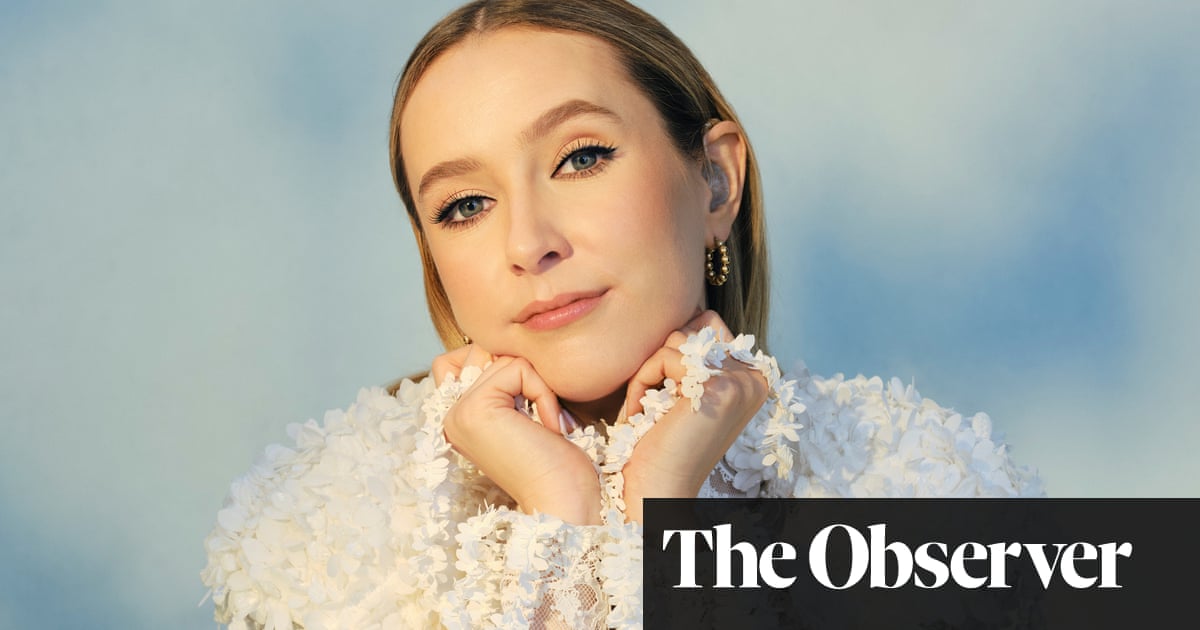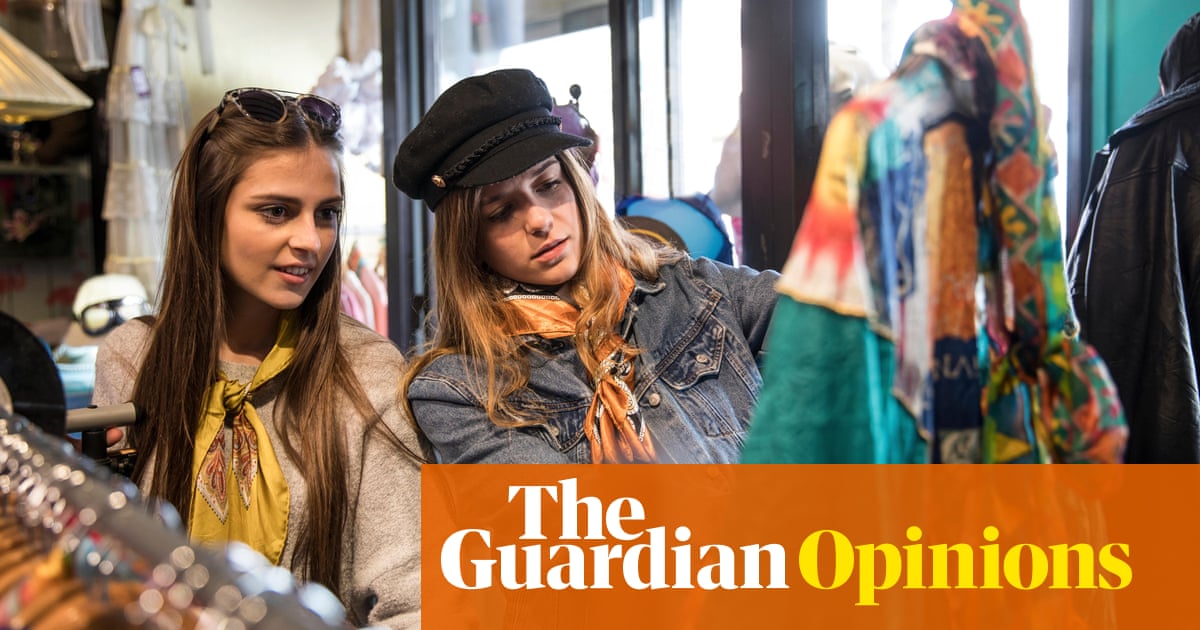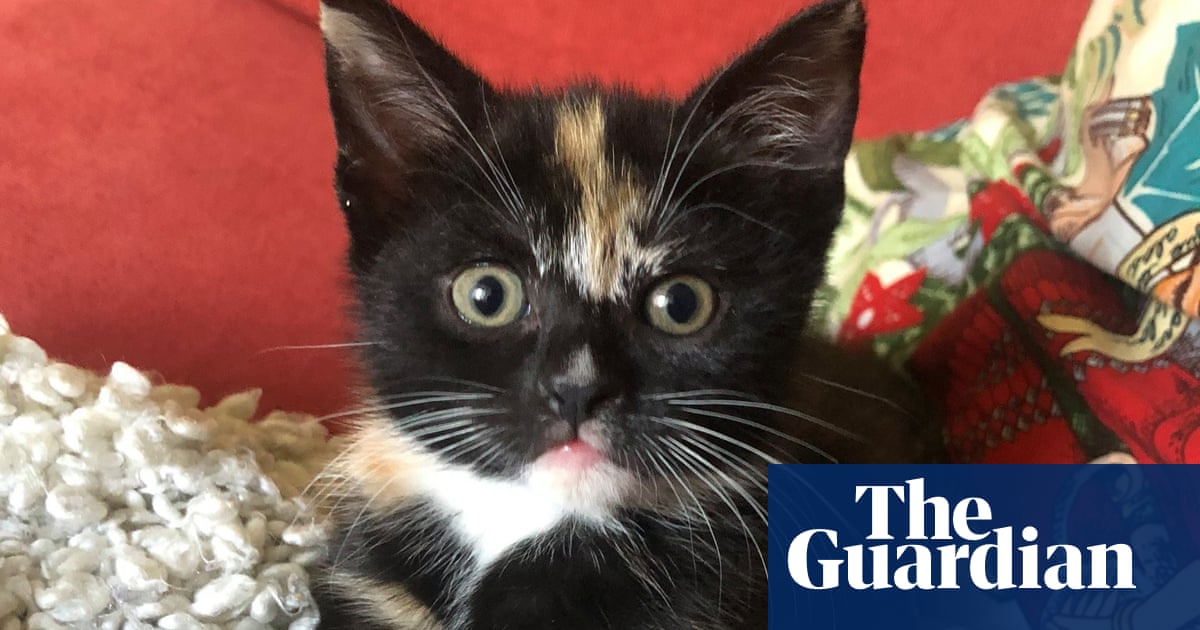
Yes, Rose Ayling-Ellis remembers the first time she saw the choreography for that Strictly dance. Her “couple’s choice” routine for the competition’s 2021 grand final. The one that won her the series – a Bafta, too – melting hearts, expanding minds, and briefly turning the sequin-heavy, primetime light-entertainment show into a deeply affecting, powerful platform for deaf visibility.
Midway through the number, the music faded out. For 20-ish seconds, Ayling-Ellis and her partner, Giovanni Pernice, danced both in total silence and synchronicity. It was a fleeting insight into how Strictly’s first deaf contestant experienced the show; a simple yet soul-stirring nod to the community she takes such pride in representing. So, of course, Ayling-Ellis recalls exactly how she felt when sitting down to watch those monumental moves being proposed. How could she forget?
“I hated it,” Ayling-Ellis says. Not the blunt answer I’m expecting. “I watched this prerecorded video by external choreographers and immediately didn’t like what they’d come up with. I was up for the idea, as long as it wasn’t a patronising stunt. An attempt to get the pity vote, all sad, dreary and ‘poor me’.” Across the table, she frowns, pulls her arms to her chest, and sways from side to side, then laughs, loud and infectiously. “It was what hearing people think deaf people experience. Very insular, cut-off, small. It was so sad. And that’s not me.”
That routine was binned. Instead, with the help of other Strictly professionals, the couple reworked it, collaboratively. “It felt totally different,” she says. “From there, we created the dance, shaping and changing it throughout the week.” The result, she hoped, would be more energetic, more vibrant, more full of life. “And most importantly,” she adds, “more true to me. It was only at camera rehearsals in the studio, when I was told the crew – who never stop – all dropped what they were doing to watch that I thought: shiiiiit. This might be a big deal.”
Almost 18 months later, Ayling-Ellis still can’t quite believe the reaction. “Totally surreal. It took a long time to properly hit me.” Interest in British Sign Language (BSL) courses sky-rocketed. She became a household name. It was particularly special for the wider deaf community. As Teri Devine, director of inclusion at the Royal National Institute for Deaf People (RNID) puts it: “Many deaf children were encouraged to embrace their hearing aids, use BSL, and feel more confident after watching.”
We’re meeting on a midweek lunchtime in May, at a studio in north London. It’s not far from where she now lives, newly single. Having just wrapped a photoshoot, she’s relaxed, back in her own gear: jeans, linen shirt and beige hoodie with illustrations spelling out the sign language alphabet by designer Deaf Identity. She requests I sit across from her at the table; her interpreter, Kirsty, settles next to me. “The setup means when you’re talking,” she explains, “Kirsty interprets in BSL, then I talk back. I’m bilingual, so I adapt to situations.”
With both EastEnders and Strictly under her belt – , and an ITV drama in the works, being on camera barely phases the 28-year-old actor and TV personality. But we’re here to discuss a new BBC documentary she’s presenting, airing later this month. It feels particularly exposing. Plenty of people approached her to make factual programmes post-Strictly. “Nearly all wanted to make films about how deaf people hear music,” she says. That didn’t appeal. “We’re so much more than that. We have politics and issues that we care about; battles that need fighting. That’s what I wanted to highlight.”
The result is Signs for Change, a film which explores the daily lives, challenges and barriers faced by deaf people in Britain. Estimates suggest 11 million people in the UK are hard of hearing, with 1.2 million adults unable to hear most conversational speech. The film grapples with discrimination, isolation, and how technology is eroding the deaf community. “It’s very personal,” she says. “On EastEnders, there was a character; Strictly was so positive. This goes deeper.” She presents with ease, but it makes confronting watching. It’s a change in tone; purposefully less celebratory. “Strictly made an impact; people became curious about deafness. But I don’t want to become what disabled people call ‘inspirational porn’ – an inspiring story, all shiny and smiles, without looking at the problems we face in this country.”
Ayling-Ellis grew up in Hythe on the Kent coast, just a few miles south-west of Folkestone. Mum works in a hospital; dad’s a surveyor. Rewatching home videos while putting together the documentary, she saw a “playful, positive and smiley girl. I was fearless, totally unafraid. Not that different to how I am now, I hope.”
When their daughter was 18 months old, her parents learned she was deaf. “That’s quite late,” she says. “Now, you often find out a few weeks after birth. Back in the 90s, it was basically someone clapping behind you, and I just always turned around.” She doesn’t remember how her parents took the news. Recently, she’s been asking questions, with some upsetting results. “My parents were told I had ‘failed’ a hearing test; that there was significant hearing ‘loss’. These are such loaded, negative words. It was set up to my parents that I had a problem that needed fixing.”
In a moving scene, she hears some of her mum’s memories. “She told me I once came into her room crying, saying I wished I wasn’t deaf.” It was shocking. “Where did that come from? I do remember thinking I’d have trouble making friends, finding a job, having a future…” She shakes her head. “I had a supportive family, but this still got in somehow.”
Language, she believes, is key. “I used to say one of my ears was worse, but there’s nothing worse about it. It’s deafer, that’s all. I hate being called ‘hearing impaired’: I’m not a hearing person who is impaired, I’m just a deaf person.” She defines herself as disabled. “But that doesn’t mean I am an able person who is ‘dis’, it means I’m disabled because the world disables me. Thinking like this can make a huge difference.”
Back then, her parents were faced with choices. “They had to decide whether to teach me sign language or not,” she says. “Some experts said don’t as otherwise she’ll never learn to speak. Evidently,” she’s quick to point out, living proof, “that’s not true. All of these experts were hearing people. Making this documentary, I learned this still happens: hearing people deciding what’s best for deaf people.” Her mother decided to teach her to sign. “If you have a deaf child,” she continues, frustrated, “and want to communicate in sign language, you have to pay for classes. That’s what my mum had to do. And she didn’t have a lot of money. Imagine all the families that can’t afford it. This hasn’t changed in 30 years – and needs to quickly.”
Her state secondary school had a specialist deaf unit, but there were only two other deaf pupils in her year, maybe nine across all age groups. Well-behaved but cheeky, she became deputy head girl. “But I was also very self-conscious. Signing meant people would stare, so I became shy. I was pushed to fit into the hearing world. To integrate.”
Then she attended a filmmaking weekend organised by the National Deaf Children’s Society. It was her first experience of spending time exclusively with other deaf people. “It was amazing,” she says, “I didn’t need to worry about fitting in. There, I felt free to be me.” It was also her first taste of performing. “I’d never considered acting before. At school, it wasn’t set up for deaf kids, there was nobody deaf on TV or in films, and I didn’t have the confidence.”
Surrounded by deaf peers, however, she found space to experiment. Still, she never imagined it could be more than a hobby. “I thought nobody deaf could be professional,” she says, “so it was a bit of fun. There was a deaf youth theatre group in London I started to go to on weekends.” Charities helped with the train fares.
While Ayling-Ellis was at university in Rochester, she kept on acting. Spotlight – the casting platform – rejected those without representation, a drama school qualification, or substantial professional experience. “Agents weren’t interested in deaf actors,” she says. “Drama school felt inaccessible. Experience was hard to get.” Instead, she found occasional performing gigs via a deaf actors Facebook group. There was an episode of Casualty, short films, a radio drama, too. “Then the BBC were looking for a deaf actor for a Stephen Poliakoff drama: Summer of Rockets.” Again, she was cast through Facebook.
In every early on-screen job, Ayling-Ellis auditioned for explicitly deaf parts; disability central to all characters. At that time, she reckons, it was her only option. “Otherwise producers would have thought: we’re looking for a hearing character, and that’s not what she is.” Did that feel limiting? “Playing the game isn’t the right phrase,” she responds, “but it was about using what I had to my advantage. Being deaf helped my career: it made me stand out. Yes, deaf characters were rare. But, I tended to get them. Of course, I knew I could play other parts; people who just happened to be deaf. But with a foot in the door, I could start to prove it so other deaf actors hopefully won’t have to.”
The plan paid off. “Having an agent, I finally had someone to vouch for me. To say yes, she’s deaf. But she’s talented. Has a personality. Isn’t just a deaf person.” Ayling-Ellis had just finished a play at the Birmingham Rep, when EastEnders called. She was cast as Frankie: daughter of Danny Dyer’s Mick. The part was meant to last two weeks. Before even recording her first scene, she’d been offered a six-month contract. The pandemic hit before filming started. “It meant we had time to build my character up,” she explains. “I wanted her to be feisty. Fiery. Maybe a little bit violent. To have layers, not defined by a disability. And, to be honest, I just wanted to be able to throw drinks.” And throw drinks she did. “Plus, someone threw a glass at me. I ran over my sister. I was kidnapped…” A sexual assault storyline was sensitively handled. The list goes on. “A lot really happened in those two years.”
Being the first regular deaf character played by a deaf actor on Albert Square was a major milestone. But her on-screen successes came with behind-the-scenes struggles. Take scripts. “You need someone with knowledge of the deaf community involved at an early stage,” she believes, “who understands deaf experiences.” This wasn’t always the case here. Important details, she says, weren’t picked up, so she had to work them out herself on set. “It’s why I did my Edinburgh TV Festival speech a few years ago.” In it, she called for greater access to the entire industry for disabled people, not just on-screen representation. “It was great to be on the show,” she says, “but it was only the start: the system wasn’t made for disabled people. We need to build and change, so in 20 years it’ll be easier for the next me.”
When the Strictly offer came through, she had to think hard. She’d barely danced before, save some childhood ballet. Live TV felt perilous with her access needs. And with subtitles for live shows slow and error-prone, she rarely watched it. “I told them, if you want me, I’ll need you to agree to certain things.” She counts them off: an in-studio interpreter neither hidden away nor centre stage; updated subtitles for the version uploaded to iPlayer; audio description for blind people; deaf-awareness training for cast and crew. “They went further than I’d asked,” she says, “so I said yes. On my first day, everyone finger spelt their name to me. It was a special gesture.”
Ayling-Ellis is characteristically understated when setting out what her victory involved.“Giovanni would dance, I would watch him do it, then copy,” she says, nonchalantly. “Muscle memory, then repeating it over and over. That was it.” Plenty of others are desperate to sing her praises. “Rose is simply astonishing,” Strictly presenter Claudia Winkleman tells me. “I need to make such a bold statement because I know her well enough to know she never would. And to be clear, Rose isn’t astonishing because she won a dance contest while not hearing the music. She’s utterly brilliant because she’s genuinely hilarious, because she’s ridiculously humble, and because she’s bonkers talented.”
In late 2022, she traded EastEnders for Shakespeare; it felt right. For her turn as Celia in As You Like It in London’s West End, she nabbed an Olivier nomination. It was a shrewd move. The jump from soap to upscale drama is notoriously tough: it’s a testament to her skills that she joins the likes of Surranne Jones and Sarah Lancashire in making it. Soon, there’ll be Code of Silence, an ITV series in development. She’ll play a deaf catering worker called upon to lip-read criminal conversations. She’s gleefully secretive, with filming kicking off next year. “We’re playing around with stereotypes,” she does offer up, all grins, “which is exciting. Having deaf people on it from the outset means we can write in clever, thoughtful, nuanced ways.”
For now, she’s still getting used to her newfound public profile. “I’ve had so many opportunities because of all this.” She gestures around us. “And I’m in this position where people are listening to me. It comes with a sense of responsibility: I don’t want to make a mistake, or let the deaf community down. It feels a lot is on my shoulders.” It’s a complicated calculation, knowing when to centre her deafness in her work or interviews, and when to let it take a back seat, “It’s a balancing act,” she says, “one I’m still working on. Nobody deaf in this country has the profile I have. I just want to get it right. The only way to do that, I think, is to be totally myself, and to make sure I enjoy every minute.”
Signs for Change will be shown later this month on BBC One and BBC iPlayer
Stylist Bemi Shaw; photographer’s assistants Zula Rabikowaka and Felix Hall Clos; hair by Ricky Walters at SALON64 using Kevin Murphy Bedroom hairspray; makeup by Jaz Crush using Charlotte Tilbury, Nars, Iconic London & Nasturtium; shot at Big Sky












